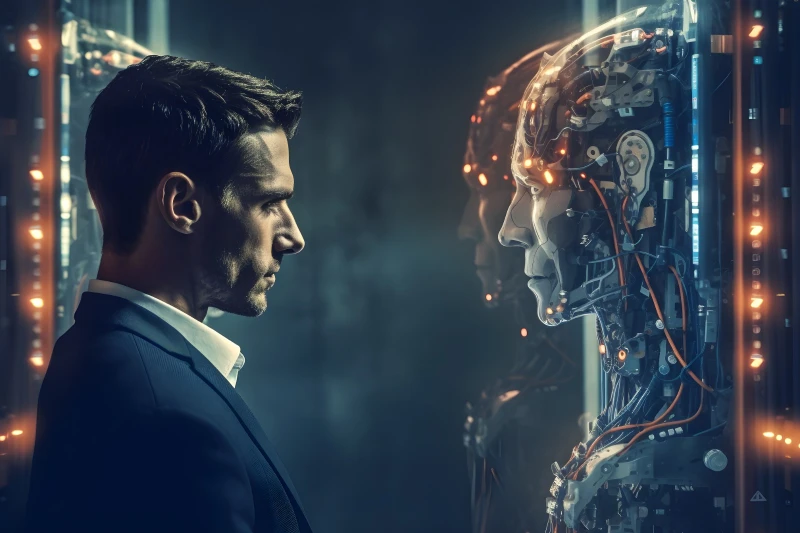Is the Internet dead?
Since its invention, the Internet has been the medium for people to share their ideas, thoughts and generally communicate. So, this might sound like a controversial question to some people, but for a while now, things have been different.

What if some of the users we interact with on social media are not human? A question that pops to mind especially with the massive growth of Artificial Intelligence during the past couple of years.
For many years now, there has been a theory called The Dead Internet theory that takes this idea even further and broadly states that most of the activity on the Internet is generated by bots.
What is the Dead Internet theory?
While it is hard to pinpoint the exact origins of it, The Dead Internet theory is a conspiracy theory that strongly suggests that the Internet now mainly consists of bot activity and auto-generated content that is manipulated by curated algorithm. Proponents of the conspiracy believe that these intelligent bots have been made to help manipulate and boost search resutls to ultimately manipulate consumers. They also accuse government agencies of using bots to manipulate public perception. The date given for this "death" was generally around 2016 or 2017.
In 2021, an article was posted on the Agora Road's Macintosh Cafe forum by a user named IlluminatiPirate, suggested the following:
Large proportions of the supposedly human-produced content on the internet are actually generated by artificial intelligence networks in conjunction with paid secret media influencers in order to manufacture consumers for an increasing range of newly-normalised cultural products.
Have we witnessed the death of the Internet without even noticing it?
Most of us can argue that we can actually tell the difference between a human and an AI-generated conversation, but what if this is not the case?
Every day, content is created, accessed and shared by billions of people around the world, or at least that is what we think. But increasingly, this content is being generated by bots and AI. In fact, back in 2016, the security firm Imperva released a report on bot traffic and found that they were responsible for 52% of web traffic, the first time it surpassed human traffic. This report has been used as evidence in reports on The Dead Internet theory.

On their 2023 Bad Bot Report, Imperva Inc. highlighted that Bad bots are 30% of automated traffic and evasive bad bots accounted for 66.6% of all bad bot traffic.
The theory also talks about AI Infuencers. Although it wasn't easy before, today it's not that hard at all to setup a social media profile of someone generated entirely in Mid-Journey. As an example, you can check the profile of Aitana Lopez on Instagram, with a whopping 112K followers at the time of this post. This "model" was created by The Clueless a modeling agency that specializes in creating AI models.
In May of 2023, influencer Caryn Marjorie released an AI version of herself to sell to fans. The die-hard ones could pay $1 USD per minute to talk to her ChatGPT4 version. I'm guessing it's the kind of stuff we'll be seeing more of in the near future.
Social media may be mostly Bots too. In a post by Kaitlyn Tiffany from The Atlantic looked at the examples of tweets with the phrase I hate texting repeated by countless accounts with similar profile pictures that have huge engagement levels far more than what would be expected of a profile of the same characteristics.
In 2019, Facebook had to shut down a staggering 5.4 billion fake accounts, bots that without a doubt distorted the social media giant's analytics and made it hard to identify real from fake traffic.

Timothy Shoup from The Copenhagen Institute for Futures Studies, stated that "in the scenario where GPT (Generative Pre-trained Transformers) 'gets loose', the Internet would be completely unrecognizable". And in this scenario, he would bet on 99% to 99.9% being AI-generated by 2025 to 2030.
But not all of this traffic is bad though. Many of these bots are and will be performing helpful tasks. In the programming world for example, AI is helping many developers revolutionize the way they work by providing valuable tools and resources to enhance their productivity and efficiency. But at the same time, it's important to acknowledge that there are also potential negative effects, like job displacement and security risks. Moreover, developers could become overly reliant on AI tools for coding, which could lead to a decline in their own capabilities to solve problems and critical thinking skills.
In conclusion, the Dead Internet theory could be an accurate prediction of a likely future if things stay the way they are. AI-generated content might take up more and more of our online space that we might end up needing the help of Sarah Connor. 😉
Regardless, computer scientists are coming up with ways to mitigate the damage. And luckily, there is something that is being done about it. Microsoft's Content Credentials for instance, the invisible digital watermark feature that will say if AI was involved in creating content. I believe that developing such safeguards is as important as the development of the AI technology itself.
In the meantime, education and critical thinking are our best allies to a brighter future, where we could enjoy the productivity gains by using AI as a tool without losing the individual creativity as human beings.
Until next time. ✌️
